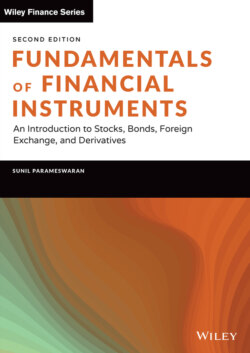Читать книгу Fundamentals of Financial Instruments - Sunil K. Parameswaran - Страница 58
На сайте Литреса книга снята с продажи.
ARBITRAGE
ОглавлениеWhat is arbitrage? The term arbitrage refers to the strategy of making costless, riskless profits by simultaneously transacting in two or more markets. This is one of the fundamental principles underlying modern finance theory. One of the basic tenets of finance is the concept of risk aversion; that is, an investor will demand a risk premium for bearing a certain level of risk, and the higher the risk associated with an investment, the greater will be the premium demanded over and above the riskless rate of interest.
Arbitrage may be defined as the presence of a rate of return greater than the riskless rate on an investment devoid of risk or, equivalently, as the specter of a positive rate of return from a trading strategy that entails neither an investment nor an assumption of risk.
Take the case of a city like Mumbai, which has two major stock exchanges, namely the Mumbai Stock Exchange (BSE) and the National Stock Exchange (NSE). Assume that a share is trading at INR 100 on the BSE and at INR 100.75 on the NSE. An arbitrageur will place a buy order for 500,000 shares on the BSE while simultaneously placing a sell order for an equivalent amount on the NSE. Before accounting for transactions costs, he is assured of a profit of . Considering the fact that he did not have to invest any money and was able to implement the strategy without taking any risk, such an opportunity should not exist.
There are certain practical issues to be considered while evaluating what looks like an opportunity for free money. First, can the trader make a profit after factoring in transactions costs like brokerage commissions? Most retail investors will have to incur such expenses; however, a securities dealing firm has a tremendous advantage for it does not have to pay such transactions-related charges. Consequently, such strategies that appear infeasible for retail traders may be profitable for institutions.
The second issue is that in this example both the exchanges have a T+2 settlement cycle. That is, if an investor were to trade on a particular day, the payment of cash to the seller and the delivery of securities to the buyer will take place two business days later. Thus, the arbitrageur cannot wait to take delivery on the BSE before giving delivery on the NSE. Consequently, to capitalize on such opportunities a potential arbitrageur needs access to a stockpile of cash as well as a long position in the security right at the outset.
In practice such opportunities will not remain for long. As arbitrageurs start buying on the BSE the price there will be driven up by the increasing demand. Similarly, as they start selling on the NSE, the increased supply will push prices down. After a brief while such opportunities will not be apparent.
In practice such opportunities exist for fleeting moments. They can be exploited by players who are always in the thick of the action such as financial institutions. The issue may be viewed as follows. A mispriced security offers a potential arbitrage opportunity. The possibility of making arbitrage profits ensures that securities are not mispriced in practice. To ensure that such avenues for profit are seized and exploited, traders increasingly rely on automated systems. One well-known type of arbitrage is Stock Index Arbitrage, which entails the exploitation of deviations from the postulated pricing relationship between stock indices and futures contracts based on them. This is not easy in practice, for if we take an index like the Standard and Poor's 500 (S&P), 500 constituent stocks have to be either bought or sold in the right proportions. Thus, the availability of a computer becomes imperative, and consequently the implementation of such arbitrage strategies is referred to as Program Trading.
